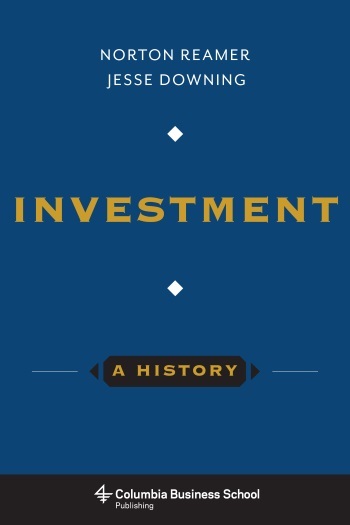The First Financial Commandment for the 21st Century: “Thou Shalt Not Plead Total Investment Ignorance”
“If people knew their history, they would marvel at the sheer range of investment opportunities now available to them. The idea that investing has become democratic probably feels alien to most people, but investing is extremely democratic today compared to past eras. So it is incumbent on the average person to learn enough to be his or her own best advocate in taking advantage of all this new-found opportunity.” — Norton Reamer
This week, our featured book is Investment: A History, by Norton Reamer and Jesse Downing. For the final post of the week’s feature, Reamer and Downing explain their first financial commandment for today’s investors: “Though Shalt Not Plead Total Investment Ignorance!”
Don’t forget to enter our book giveaway for a chance to win a free copy of Investment: A History! You can also learn more about the book and its authors on the Investment: A History webpage and Youtube channel!
The First Financial Commandment for the 21st Century: “Thou Shalt Not Plead Total Investment Ignorance”
For thousands of years, the only people who qualified as “investors” were wealthy and politically connected landowners. Investment opportunities were few and accessible only to the elite. Yet in the blink of an eye, historically speaking, that world has been replaced by one full of investment opportunities for “everyman,” from stocks and bonds, to mutual funds, to life insurance, to pension plans, to real estate, and many other vehicles for investment.
“If people knew their history, they would marvel at the sheer range of investment opportunities now available to them,” says Norton Reamer, co-author of Investment: A History. Reamer is also the founder of United Asset Management and former CEO of Putnam Investments. “The idea that investing has become democratic probably feels alien to most people, but investing is extremely democratic today compared to past eras. So it is incumbent on the average person to learn enough to be his or her own best advocate in taking advantage of all this new-found opportunity.”
Investment Restrictions Have Fallen Away Over Centuries
Reamer says that history is rife with examples of just how elitist and inaccessible investing used to be. He believes that if more people knew this history, they might be more enthusiastic about investment literacy, and more motivated to learn basic investing principles:
– 3,000 years ago, if you were an investment manager you were most likely a slave. The wealthy delegated investment activities to trusted slaves, who sought to prove their worth and loyalty by managing their masters’ wealth.
– In the 18th century, religious leaders denounced life insurance as betting against God. And up until 1840, in many places a widow could not be the beneficiary of her husband’s life insurance policy: she had to stand in line behind his creditors before getting a dime.
– 150 years ago “retirement” did not exist: the only example of retirement from history is in ancient Rome (soldiers were given provincial land grants to provide them income and keep them from meddling in politics). The financial vehicles used to fund retirement today are quite a recent invention; these huge pools of retirement money have changed the face of global finance and put a great deal of resources into the hands of common people.
“Thou Shalt Not Plead Ignorance”
“Pleading total investment ignorance is no longer a viable response to a world of steadily increasing investment opportunity,” says Reamer. “A great deal of work has been done in the last 100 years to level the playing field and deploy investment resources for the benefit of the average working person. It’s incumbent upon all of us to learn enough to be counselors on our own behalf.”
“For the inexperienced, investing can be intimidating and appear complex, but being a sensible investor is remarkably uncomplicated,” says Jesse Downing, co-author of the book and an investment professional in Boston. “Successful investors throughout history have illustrated the importance of sticking to basic principles.”
Reamer and Downing have identified a few guideposts that may help nascent and professional investors alike:
1. Focus on what’s “real” – Don’t get distracted by the form of an investment (e.g., a stock certificate or a bond note). Make sure you understand the real asset behind the piece of paper, such as the company behind the stock you are buying, or the public works project issuing the bond.
2. Focus on fundamental “value” – The value of an investment today is determined by the present value of the future cash the entity will produce over its lifetime. Don’t be distracted by valuation gimmicks or market gyrations.
3. Consider the intelligent use of leverage – Too much leverage is dangerous, but most of the great fortunes in history were built using moderate and smart amounts of leverage. For example, a home mortgage is a sensible form of leverage for most families.
4. Allocate your capital – Every investment is an “allocation” of capital. That is, it’s a choice between competing priorities and opportunities. Make informed, deliberate choices and tradeoffs as you decide where to put your money.
“Financial self-reliance is a possibility for more people today than at any point in human history,” says Reamer. “All thanks to improvements in the accessibility and diversity of investment opportunity. Whether you are buying a house, or a stock ETF, or a retirement mutual fund, you are riding a wave of democratization that has completely remade the world of global finance. We encourage everyone to learn some basic principles and take full advantage of it.”







